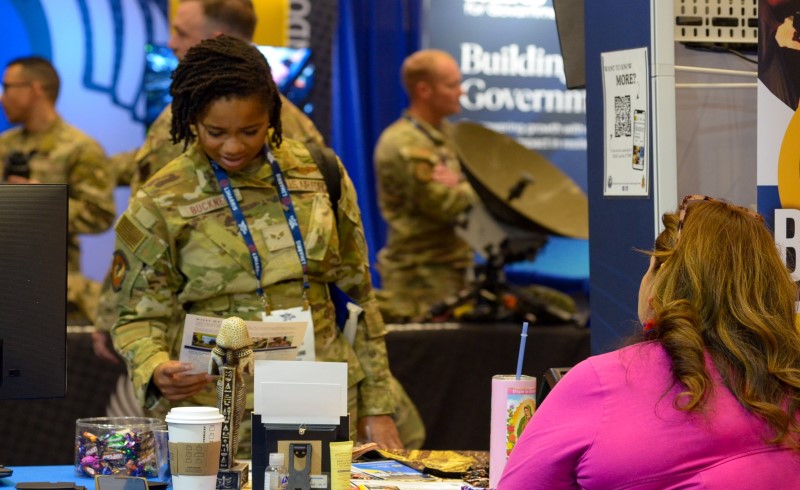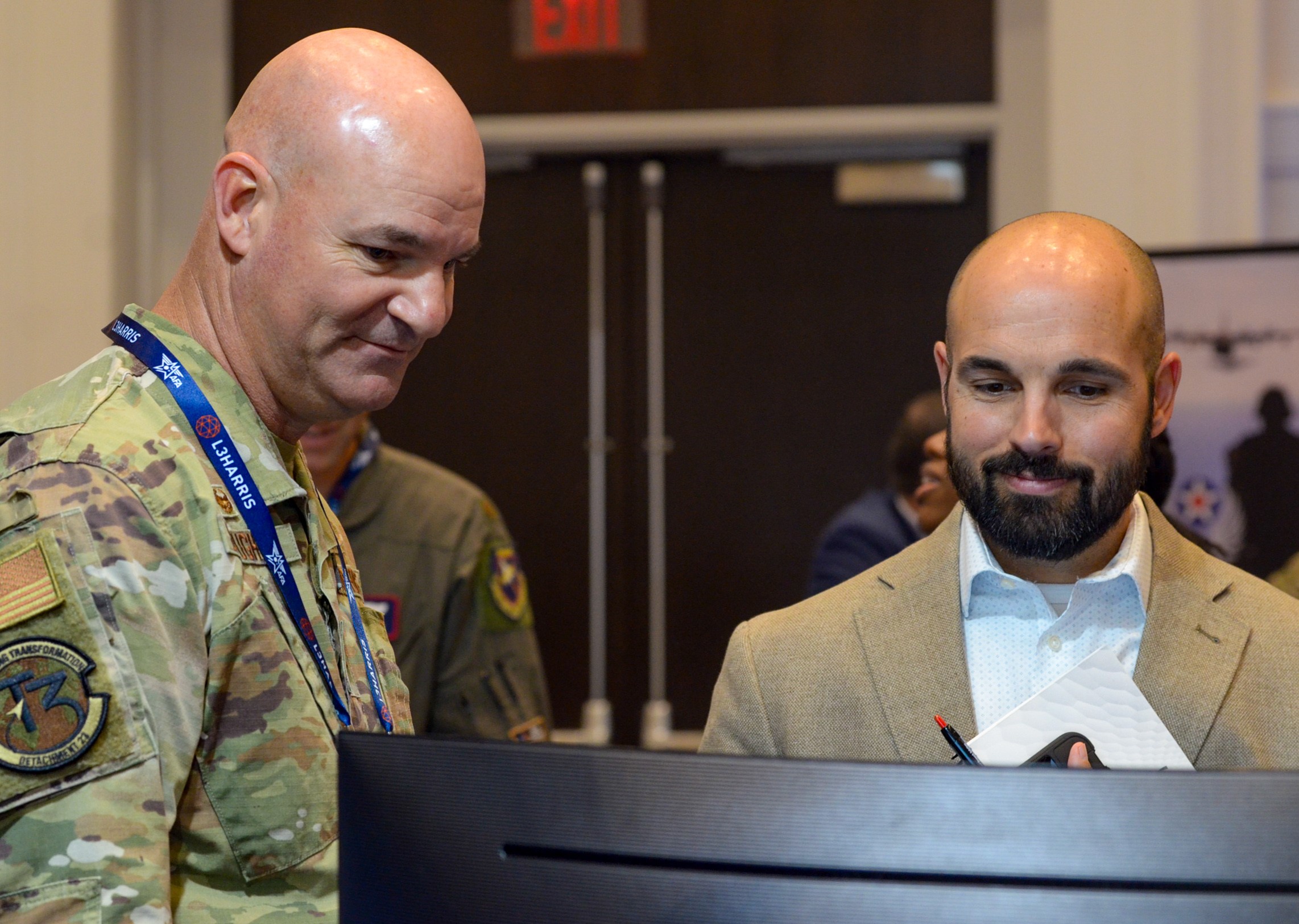News & Events
DLIELC attends AFA, underscoring strategic partnerships
Published Nov 19, 2024
By Agnes Koterba
637th Training Group< - Strategic Communications

Members from the 637th Training Group, Defense Language Institute English Language Center, Emily Romero, English Language Training Specialist for Policy, Plans, and Programs, and Agnes Koterba, Strategic Communications Specialist, team up with Second Air Force to present at the Air and Space Forces Association Conference on the all-encompassing training mission at National Harbor, Maryland, September 16, 2024. The DLIELC mission goes beyond teaching English and remains a steadfast cultural exchange that builds partnerships worldwide through English language training and cultural immersion for international military partners and pre-basic combat trainees in the U.S. Army and Coast Guard. (U.S. Air Force photo by Agnes Koterba)

Maj. Steven Draughon, Commander at Second Air Force Detachment 23, and Innovation Lead Master Sgt. Jared Rice, 82nd Training Wing, 362nd Training Squadron, who presented alongside DLIELC, demonstrate their Intelligent Tutoring System at National Harbor, Maryland, September 17, 2024. The DLIELC mission goes beyond teaching English and remains a steadfast cultural exchange that builds partnerships worldwide through English language training and cultural immersion for international military partners and pre-basic combat trainees in the U.S. Army and Coast Guard. (U.S. Air Force photo by Agnes Koterba).
JOINT BASE SAN ANTONIO-LACKLAND, Texas —
Despite early mornings and late evenings, the hustle-and-bustle of the Air, Space, and Cyber Conference sparked collaboration and meaningful conversation. The latest in defense and technology were key topics at this year’s conference organized by the Air and Space Forces Association.
Members from the 637th Training Group, also known as Defense Language Institute English Language Center, Emily Romero, English Language Training Specialist for Policy, Plans, and Programs, and Agnes Koterba, Strategic Communications Specialist, teamed up with Second Air Force to present the all-encompassing training mission
Service members, government personnel, and industry experts attended the three-day convention that discussed the groundwork for shaping strategy and innovation within national defense operations. Presentations and exhibits were on the schedule highlighting the theme Achieving Decisive Advantage in an Age of Growing Threats.
With exhibits in place, Second Air Force presenters highlighted industry innovations and strategic direction to attendees bringing an open dialogue and focus to technical training transformation efforts and competency-based learning.
The unique mission of DLIELC sought to bring awareness to those exploring the various Second Air Force displays. DLIELC provided fact sheets and student gifts, allowing the team to share insights into the “importance of the Security Cooperation mission that DLIELC provides to our international partners and the U.S. security cooperation community,” Romero stated.
The mission goes beyond teaching English and remains a steadfast cultural exchange that builds partnerships worldwide. DLIELC aims to build collaboration between U.S. and international service members. The conference provided the opportunity for teamwork, feedback, and shared partnerships.
Maj. Steven Draughon, Commander at Second Air Force Detachment 23, and Innovation Lead Master Sgt. Jared Rice, 82nd Training Wing, 362nd Training Squadron, presented alongside DLIELC fostering an exchange of information amongst colleagues.
“The main takeaways we get from AFA and being able to exhibit is the exposure of our effort and the collaboration between likeminded individuals,” Draughon said. “It allows us to connect with other innovators who might already be working on or thinking about creating something similar. It also affords us the opportunity to get feedback and see if there are ways we can approve the prototype we currently have as we continue to develop the features.”
DLIELC not only shared in the importance of the global mission, but teammates, like Rice, also walked away with a shared sense of accomplishment, having learned from one another.
“Just about every person I talk to asks amazing questions that have helped me get me to where we are today. It’s a continuous feedback loop and as we transition from prototype to a production environment, I hope it continues so this can evolve and only become better over time,” Rice said.
Second Air Force hoped to demonstrate the breadth of their capabilities and their role within the overall Air Force framework.
“Events such as AFA are very important to the training enterprise, because by in large we are not often thought of by our peers in the field. That is to say that when we execute our mission, we provide an amazing product to the Air Force, joint community, or to our coalition partners but the focus is on the graduate and their capabilities (as it should be) not the process it took to build the exceptional Air Minded Warrior,” said Maj. Christopher Sweeney Second Air Force Director, A4 Directorate of Logistics, Engineering & Force Protection.
“By attending these expos, we shine a light on the tremendous efforts done by our instructors, cadre and support teams to bring the best educational content, materials, and learning modalities together to produce that graduate,” Sweeney said.
DLIELC, the 637th Training Group aligned under the 37th Training Wing, is the Department of Defense’s Executive Agent for English language training programs. Also known as the “Gateway to America,” DLIELC builds security cooperation capability through English language training and cultural immersion to more than 100 countries, as well as in over 30 nonresident locations around the world.